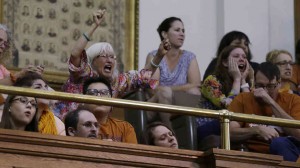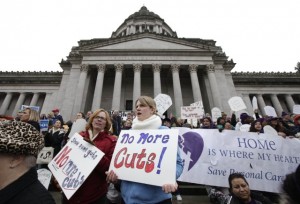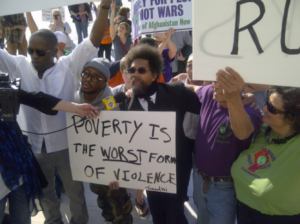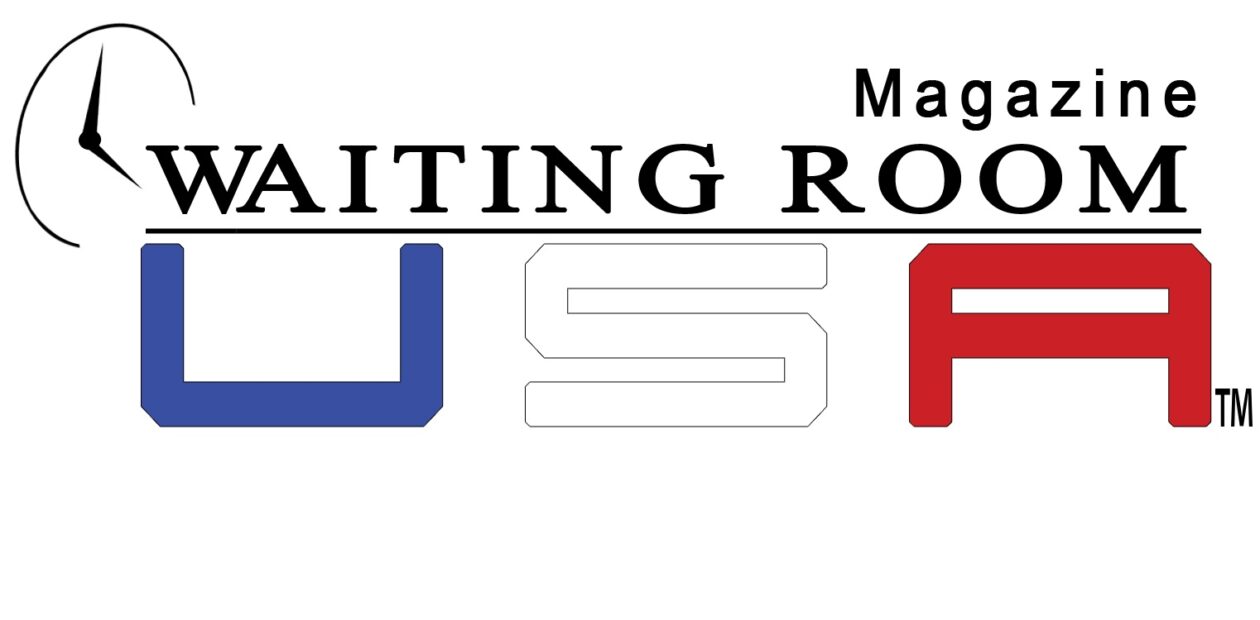New Laws Hurting The Poor and Unprotected in US
Becky Kospanova
 Nobody wants to be poor. However, more and more people in the United States are becoming just that – poor. According to US Census Bureau’s data from November 2012, more than 16 percent of American population (or nearly fifty million people) live in poverty. Over the last decade, the number of people who struggled to provide for basic needs such as food, housing, medical care and such was steadily growing (to compare, poverty level was 11.3 percent in 2000, 12.7 percent in 2004, 13.2 percent in 2008, and 15.1 percent in 2010). There are numerous factors which contribute to increasing level of poverty in the USA such as difficult economic climate in the country, high unemployment rates, inadequate access to proper education and job training for many people, growing cost of life, insufficient government assistance, and so on. Still, one would hope that people who are already disadvantaged in many areas of life will at least have the same rights and privileges as their better-off counterparts. Sadly, it is not always the case. One of the most important cornerstones of American democracy is the right to vote. However, in the last few years many states such as Georgia, Indiana, Alabama, Arkansas, Texas, Mississippi, Virginia and others have embraced strict voter ID requirements in order to prevent voting fraud.
Nobody wants to be poor. However, more and more people in the United States are becoming just that – poor. According to US Census Bureau’s data from November 2012, more than 16 percent of American population (or nearly fifty million people) live in poverty. Over the last decade, the number of people who struggled to provide for basic needs such as food, housing, medical care and such was steadily growing (to compare, poverty level was 11.3 percent in 2000, 12.7 percent in 2004, 13.2 percent in 2008, and 15.1 percent in 2010). There are numerous factors which contribute to increasing level of poverty in the USA such as difficult economic climate in the country, high unemployment rates, inadequate access to proper education and job training for many people, growing cost of life, insufficient government assistance, and so on. Still, one would hope that people who are already disadvantaged in many areas of life will at least have the same rights and privileges as their better-off counterparts. Sadly, it is not always the case. One of the most important cornerstones of American democracy is the right to vote. However, in the last few years many states such as Georgia, Indiana, Alabama, Arkansas, Texas, Mississippi, Virginia and others have embraced strict voter ID requirements in order to prevent voting fraud.
 Voter ID laws require that all voters present government-issued photo IDs at the time of voting, but many critics are concerned that the law might disenfranchise many potential voters, predominantly poor, elderly, and women. According to the study by New York University’s Brennan Center, about 11 percent (or 21 million people) of eligible American voters do not have government-issued photo IDs and do not have necessary means to get them. Moreover, the issue is even worse for elderly (about 18 percent of them do not have current photo IDs) and women (only about 66 percent of voter women have proof of citizenship which matches their current name because many women change their names when they get married). As such, voter ID laws might prevent many people, predominantly poor, from exercising their constitutional right to vote. Among other laws which negatively affect the poor is mandatory testing for drugs if a person is applying for welfare.
Voter ID laws require that all voters present government-issued photo IDs at the time of voting, but many critics are concerned that the law might disenfranchise many potential voters, predominantly poor, elderly, and women. According to the study by New York University’s Brennan Center, about 11 percent (or 21 million people) of eligible American voters do not have government-issued photo IDs and do not have necessary means to get them. Moreover, the issue is even worse for elderly (about 18 percent of them do not have current photo IDs) and women (only about 66 percent of voter women have proof of citizenship which matches their current name because many women change their names when they get married). As such, voter ID laws might prevent many people, predominantly poor, from exercising their constitutional right to vote. Among other laws which negatively affect the poor is mandatory testing for drugs if a person is applying for welfare.
 Florida has already adopted the law (if a person tests positive, he/she is denied the benefits for one year after which a person can take another test and reapply for benefits), and many other states such as Alabama, Louisiana, Kentucky, and Oklahoma are considering the enforcement of the law as well. However, mandatory drug tests violate Fourth Amendment which restricts what types of searches states can enforce. Moreover, it is evident that this law specifically targets the poor segment of American society. After all, all kinds of people receive government assistance (businessmen, farmers, etc.), but only welfare recipients are required to pass drug tests. The woes of poor do not end here because there are many other laws which target them. For example, many states have laws in place which punish homeless people. According to the data from US Department of Housing and Urban Development, there were about 643 thousand homeless people in the USA in 2009, and as many as 3.5 million people experience homelessness in any given year. However, many states have adopted laws which prohibit activities such as sleeping/camping, eating, sitting, and begging in public spaces and punish the offenders with fines and/or incarceration. Sometimes, these laws veer on the edge of ridiculous as demonstrated by the law in Houston, TX where it is illegal to “molest garbage containers,” thus prohibiting homeless people from looking for food there.
Florida has already adopted the law (if a person tests positive, he/she is denied the benefits for one year after which a person can take another test and reapply for benefits), and many other states such as Alabama, Louisiana, Kentucky, and Oklahoma are considering the enforcement of the law as well. However, mandatory drug tests violate Fourth Amendment which restricts what types of searches states can enforce. Moreover, it is evident that this law specifically targets the poor segment of American society. After all, all kinds of people receive government assistance (businessmen, farmers, etc.), but only welfare recipients are required to pass drug tests. The woes of poor do not end here because there are many other laws which target them. For example, many states have laws in place which punish homeless people. According to the data from US Department of Housing and Urban Development, there were about 643 thousand homeless people in the USA in 2009, and as many as 3.5 million people experience homelessness in any given year. However, many states have adopted laws which prohibit activities such as sleeping/camping, eating, sitting, and begging in public spaces and punish the offenders with fines and/or incarceration. Sometimes, these laws veer on the edge of ridiculous as demonstrated by the law in Houston, TX where it is illegal to “molest garbage containers,” thus prohibiting homeless people from looking for food there.
The craziness does not stop with homeless people. For example, third of states have debtors’ prisons where people can be put for showing “contempt of court” and being unable to repay a debt is considered as contempt of court during a lawsuit; in Arkansas, you can be thrown in jail for being late with your rent for as short period of time as ten days; in Wisconsin, legislators are proposing to have a right to monitor your bank accounts if you receive unemployment benefits and a right to freeze your accounts if the state makes a mistake with unemployment payments. All in all, it is clear that being poor in the US puts a person in a very vulnerable position and the laws are just not there to properly protect these unfortunate people.

